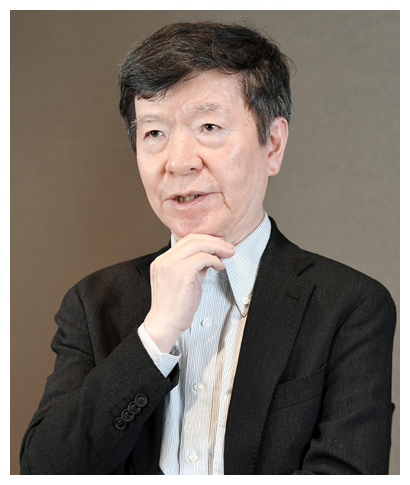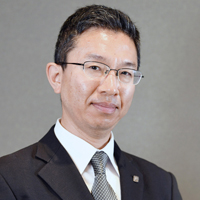To leverage RIKEN's comprehensive capabilities and to conduct more effective management with a stronger strategic focus, a new system was introduced in fiscal year 2025. It consists of five research domains-Pioneering Science; Mathematical, Computational and Information Science; Life Science; Sustainable Science; and Physical Science. Each research domain is led by an Executive Director of Science, an internationally outstanding scientist who possesses extremely high expertise both academically and in research management. These Executive Directors of Science encourage cross-disciplinary collaboration based on advanced specialized knowledge, accelerating the creation of new knowledge. Supporting research promotion alongside the five Executive Directors of Science are the Promotion Division Directors.
We asked about the goals of each domain from both researchers' and administrative departments' perspectives.
- Life Science Domain
- This domain aims to approach the essence and totality of life, spanning different levels, time axes, and species, and the span of mechanisms of complex life, including genomes, epigenomics, and environmental factors.

Eisuke Nishida
Executive Director of Science, Life Science Domain
In the 20th century, it was still possible to achieve significant breakthroughs in life science through individual efforts. However, uncovering the complexities of life as a system requires teamwork that harnesses each researcher's ideas and curiosity. Today, life science has evolved into an interdisciplinary field that goes beyond biology, incorporating computational science and engineering. A pressing issue in life science now is how to effectively leverage the current dramatic advances in AI.
In 2018, I joined RIKEN as the Director of the Center for Biosystems Dynamics Research, where I studied aging and lifespan using model organisms such as nematodes and small fish. Although Japanese people are known for their longevity, the average healthy lifespan-years spent in good health-is significantly shorter than the average life expectancy: by about nine years for men and twelve years for women. This gap presents a major societal challenge.
Aiming to extend the healthy lifespan
The life sciences domain at RIKEN, which is composed of four research centers, has adopted the concept of "Total Life Science." This encompasses research spanning the entire human lifecycle from birth to aging, focusing on physical and mental health, the causes of diseases, and their treatments. Leveraging RIKEN's comprehensive strengths in computational science, AI, and robotics, we aim to contribute to extending the healthy lifespan, creating innovative drug discovery and medical technologies, and addressing societal challenges such as Japan's declining birthrate and aging population. Also, with the growing emphasis on planetary health-balancing the health of people and the Earth-we are promoting research on the interactions between environmental and genetic factors in life phenomena. To achieve this, we are also deepening collaborations with universities and industry.
The Center for Integrative Medical Sciences (IMS) contributes to the development of new drugs and therapies for immune and allergic diseases. Precise measurement of molecular and cellular behaviors and integrated "cross-organ" analyses that consider multiple organs as a total system are crucial.
The Center for Biosystems Dynamics Research (BDR) aims to comprehensively understand the life cycle from birth to death using mathematical models and to reproduce biological phenomena using organoids (mini-organs), while developing foundational technologies to control these processes. This approach is expected to help extend the healthy lifespan.
The Center for Brain Science (CBS) focuses on exploring the essence of the "mind." What distinguishes humans from other animals is the mental activity represented by intelligence, sensibility, and sociality. Understanding the mind also aids in elucidating behavioral patterns. Researchers at the center also search for diagnostic and therapeutic methods for mental and neurological disorders.
The RIKEN BioResource Research Center (BRC) collects, preserves, and distributes a vast array of animals, plants, microorganisms, and cells under world-class quality control and cultivation technologies. It maintains one of the largest collections of mouse strains worldwide. Since research involving humans poses ethical challenges, these experimental animals are indispensable for learning how to overcome diseases. Having our own bioresources strengthens our research foundation and further enhances our added value.
Acting as a catalist for integrating fields
Many researchers belonging to the four centers have produced world-class achievements. The advent of AI marks a major turning point in life sciences, and the launch of this cross-disciplinary domain is timely. As the overall director of the domain, I strive to serve as a "catalyst," ensuring that the sum of "1 + 1" becomes not just 2, but 3 or even 4. I respect each individual's free ideas and am committed to helping them fully realize their potential.

Mitsutaka Nagano
Division Director, Life Science Research Promotion Division
RIKEN has participated in largescale international projects such as the Human Genome Project. Our goal as a domain is to leverage the scale advantages to continuously tackle major scientific challenges such as achieving healthy life cycles. The four centers are geographically spread across Wako, Tsukuba, Yokohama, and Kobe, each having developed close relationships with local universities and governments in the region. Drawing on this experience, I will support fostering closer ties among the centers.
Rate this article
Stars





Thank you!
Submit






